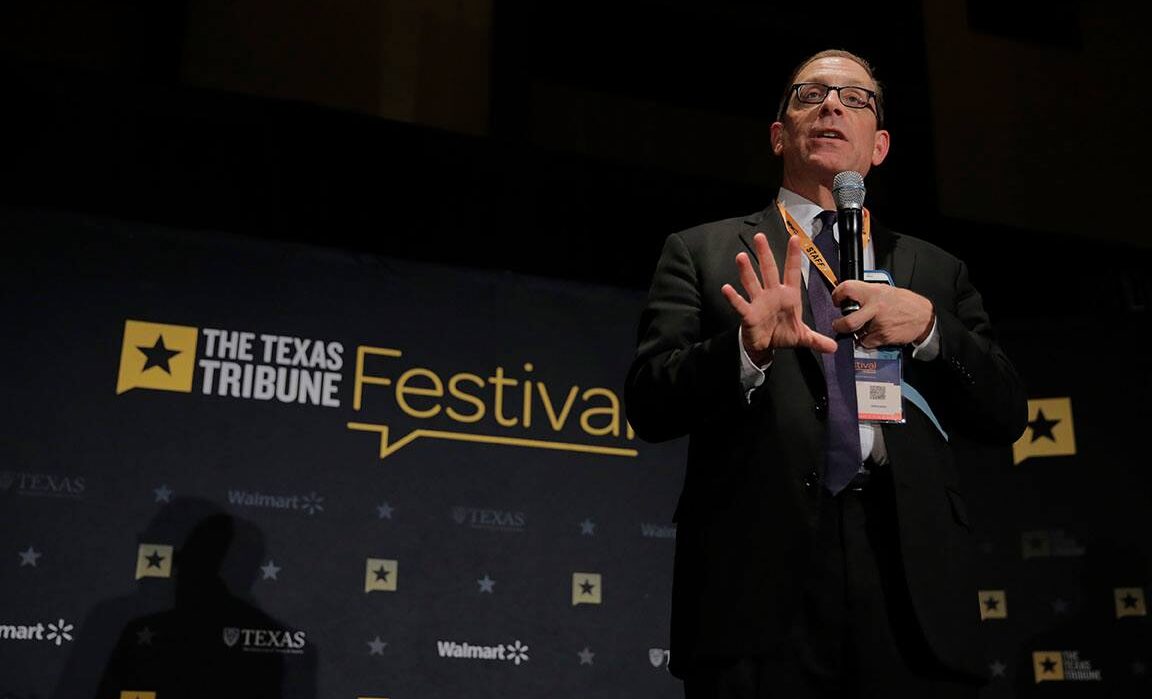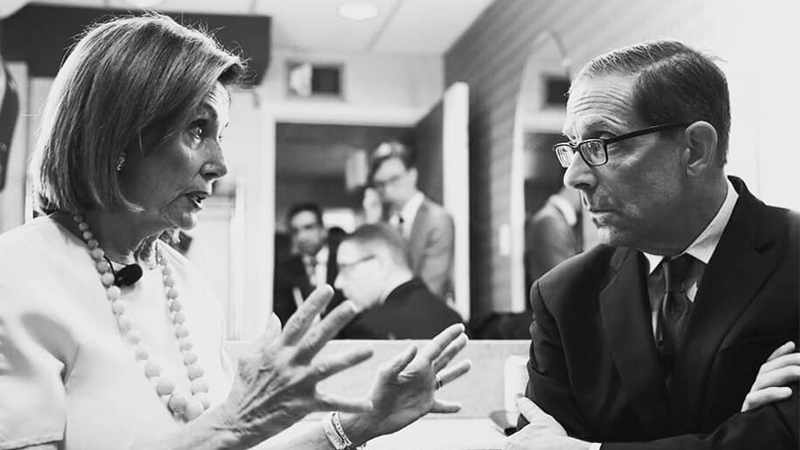‘Pull No Punches, But Hit Both Cheeks’: Texas Tribune CEO Evan Smith on Nonprofit Journalism, Media Bias, and What He Wants on His Tombstone

Photo via Evan Smith on Facebook.
Texas Tribune CEO Evan Smith was in a cheerful and contemplative mood when I called him earlier this week to look back on his nearly 13-year tenure at the nonprofit media outlet he helped create, sharing his unfiltered thoughts on the unique circumstances of the Tribune’s launch, how media outlets should navigate issues of bias, why he’s still optimistic about the future of journalism, and what he wants on his tombstone.
I lived in Austin, where the Tribune is headquartered, for five years, and since then, they’ve been one of my top sources for Texas news. The 2022 Texas Tribune Festival (aka “TribFest”) kicked off Thursday.
Smith, along with Austin venture capitalist John Thornton and former editor and owner of Texas Weekly Ross Ramsey, founded the Tribune with $4 million in seed funding. They’ve maintained their nonprofit status and have grown their staff into the largest statehouse bureau in the U.S., according to the Pew Research Center.
Launching a media outlet in a recession
Founding a new media company is never a simple thing, and at the time the Tribune launched in 2009, the industry was still adjusting to the emerging online environment as well as the recession that began in 2008.
However, in Smith’s view, the Tribune was “set up for success” precisely because they were founded under those challenging conditions. At that time, he told me, “Everybody thought that the media business was heading in the wrong direction — we certainly thought that, but everybody else thought that [too].”
“There’s never the ‘right time’ to do anything,” Smith continued. “I think one of the problems with the startup culture is that people want to wait until the exact, precise moment when things will magically succeed and you’ve totally ‘de-risked’ it. And that precise moment never exists, has never existed, will never exist.”
In fact, Smith suggested, “the time that seems to be the worst to start something is the best time because expectations are at the absolute lowest point,” because you’ll be seen as a success when you “overdeliver on those low expectations…lowering the threshold that you have to get over is a hack of sorts.”
The benefits of being a nonprofit media organization
The Tribune’s nonprofit status is “much less unique now,” but it “was unique at the time,” said Smith, and in his view was a key factor to their success. If they had attempted to launch as a for-profit, that would have been “the same economic model that was not allowing other organizations to do everything they wanted and needed to do.”
They started with “a little less than $4 million in the bank,” and had been “cash flow positive every year.” The organization has “the most money we’ve ever had in the bank,” and has raised over $112 million since its founding, he said.
The Tribune had been in growth mode throughout its existence, he added, and the “vast majority of our spending every year is on people…I believe that the right thing to do, is to invest in your journalism and to put bodies on the ground in places where they need to be.”
They currently have about 90 people on staff, “and it will go to 100 in the blink of an eye,” Smith told me, proud of their status of having more journalists in a state capital than any for-profit or nonprofit news organization in the country. Outside of Austin, they have full-time reporters based in Washington, D.C. and cities scattered across Texas, with plans to add more.
“This is a sustainable economic model for producing serious journalism, period,” Smith emphasized — but he was less optimistic about whether that model could be replicated outside of Texas.
There were “a lot of people” who looked at the Tribune and thought “we can franchise the restaurant,” he said, but, no, it wasn’t that simple.
The Tribune had done well “in large part” because of “things that are very particular to Texas,” he explained: the economic environment, “the high net worth individuals in our state — we have more than any other state,” companies with their headquarters in Texas that had an interest in legislative business and were willing to be sponsors, and foundations of all sizes that supported their work.
It was flattering, he acknowledged, to see “people all over the country who are starting organizations that they’re describing as the Texas Tribune of ‘Blank,'” and while the Tribune’s focus was obviously on Texas, they did hope that the other 49 states could “have a reliable, credible, independent source of news, and if we are indirectly responsible for that happening, then I’m obviously proud of it.”
Smith was adamant about his opposition to paywalls. “A public service mission cannot be accomplished behind a paywall,” he insisted. “If the goal is to get more people into a conversation about the priorities of their community and their stake, and then the first thing you do is you put a barrier between you and them, you’re doing it wrong.”
“The way to do this is, make it freely available for anybody to read,” he added, “And I’m really proud that we’ve never veered from that, that there will never be a paywall at the Texas Tribune.”

Photo by Callie Richmond, Texas Tribune
The issue of media bias
As the CEO, Smith doesn’t engage directly in hiring reporters — that’s the editor-in-chief’s role — but did say that as an organization they had a “very specific idea” about who exactly was a “Texas Tribune journalist.”
They sought to hire reporters, he explained, who “understand that their only job is to is to fulfill, embrace, and fully lean into our mission, which is to inform and engage Texans and to help them be more thoughtful and productive citizens,” “who are curious about the world,” and “who are open to talking to everybody and listening to everybody, who are committed to searching for the truth and telling all of us what they’ve found and are interested in holding people in power and taxpayer-funded institutions accountable without regard to party, partisanship, or ideology.”
On the idea of being “nonpartisan,” Smith said, “I think we have a journalistic obligation and responsibility to pull no punches, but to hit both cheeks…if we’re only holding one side accountable, we’re doing it wrong.”
One crucial decision they made before the launch, said Smith, was “no editorials, no endorsements.”
“Our job is not to tell people what to think,” he explained. “Our job is to tell people to think. That is a distinction. And so from my perspective, the question of objectivity vs. subjectivity or partisanship vs. nonpartisanship Here is where it lands: it’s about the truth and it’s about facts. And that’s what we focus on.”
Smith was very proud of the fact that “not one time” had the Tribune “compromised our editorial independence or integrity for a donor or a sponsor. Never. Never.”
He mentioned that they had “driven off” financial supporters on “both sides politically” for “not carrying their water, or doing their bidding.”
“I’ve said many times, I can always get more money. I can never get more integrity. The first time you compromise the independence of your journalism is the last time you’ll have the opportunity to, and should.”
The United States of Confirmation Bias
When asked what media he personally consumes, Smith described his role as needing to “be aware” of what stories were gaining momentum and wanting to hear a wide range of perspectives, and rattled off a list of sources.
“I’m still curious about the world enough to not be fixed on one source of news or truth…I watch CNN, MSNBC and Fox News — all — [and] I read a lot every day,” he said, mentioning The New York Times, The Washington Post, The Wall Street Journal, Politico, Axios, Punchbowl News, The New Yorker, The Atlantic, and the newspapers in each of Texas’ major cities.
It was an ongoing problem in America, said Smith, which he had dubbed “the United States of Confirmation Bias,” with people choosing to “self-exile,” and only consume media “you already agree with.”
“I think that’s the poison in democracy right now. And the kind of public service journalism that we do is the antidote. Real balance, not false equivalency. We tell stories about people whose lives are impacted by the decisions made at the Capitol here and the Capitol in Washington.
“We do not believe in silos,” he said, but “nonpartisan is not non-thinking. When bullshit needs to be called, we call bullshit. If you lie to us, we will call that out.”
“Never forgive, never forget, never regret.”
When I asked Smith if there was anything he wished he “could hit a rewind button and do differently, he said there were perhaps a few “little things,” like not attempting to build their own content management system from scratch and some ways they had initially structured the beats for their reporters, but “substantively, I think the calls we made stand up over time, I might make them differently if I were back in the moment knowing what I know now. But I also might not.”
“My tombstone will say ‘never forgive, never forget, never regret,'” said Smith. “That last part is important. There’s no point in looking backwards. We are enormously successful at what we do, beyond what we ever had a right to expect. I’ll take the win.”
What’s next — for the Tribune, for the media industry, for democracy
Smith was effusively optimistic about the Tribune’s future, looking forward to transitioning from being the CEO to a reader and donor. He declared he had “no doubt they will continue to be successful,” and even more successful after he was gone, referencing the challenges created by “founder’s disease,” where the founder “becomes inadvertently an obstacle to progress and evolution by being so wedded to the origin story, by being the keeper of the flame.”
“We set out to make Texas better by making Texans more informed and more engaged…I think we’ve absolutely done that and we’re not done doing that,” said Smith. “I’m just I’m as optimistic about the future of the Tribune as ever, [and] I’m also optimistic about the future of journalism,” because “people are cottoning to the idea that it really is a straight line between the kind of work that we and organizations like us do and the health of our democracy.”
America was “in a very difficult spot right now in this country — democracy is indeed at risk,” he continued. “The polarization that has become a fact of life in politics is in part driven by people not having adequate information to sort through the choices in front of them.”
“People have retreated to their corners,” Smith concluded, but “more journalism and better journalism is the answer to most problems, and it certainly is an answer to this.”





Comments
↓ Scroll down for comments ↓